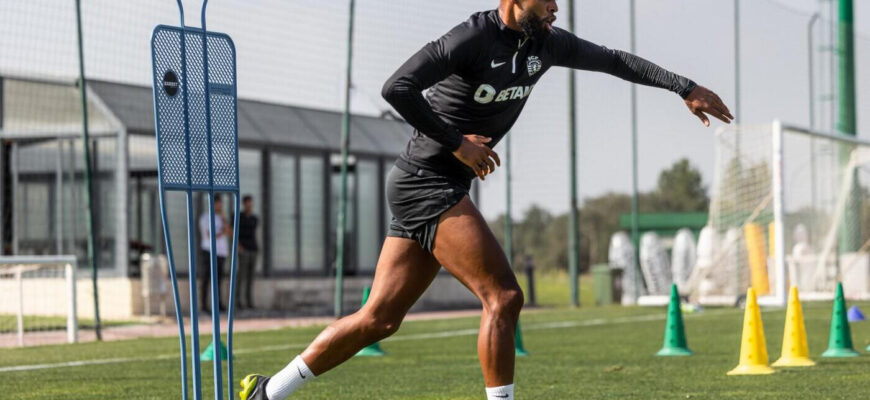A dramatic public dispute has erupted between Portuguese football giant Sporting CP and Dutch defender Jeremiah St. Juste, laying bare the complexities of player-club relations in the high-stakes world of professional football.
In a scenario that feels more akin to a legal drama than a sporting narrative, Sporting CP and Jeremiah St. Juste have taken their grievances public. At the heart of the matter lies St. Juste`s unexpected demotion to the club`s B team and the conflicting accounts of how this decision was communicated, or rather, miscommunicated.
The Player`s Grievance: A Tale of Broken Promises and Press Leaks
Jeremiah St. Juste, a central defender, released a statement via social media, painting a picture of a player feeling increasingly isolated and disrespected by the club. His narrative begins with an initial reassurance:
“At the beginning of the transfer window, I was told by the club that I didn`t need to leave because the coach was counting on me this season.”
However, this initial clarity quickly dissolved. According to St. Juste, when the season commenced, he was suddenly excluded from the main squad. The crucial element of his complaint is the alleged lack of direct communication:
- Neither the coaching staff nor the management reportedly spoke with him about this change.
- Instead, he claims he was “ignored” while his agents were simultaneously approached by the club regarding a potential sale due to his expiring contract.
St. Juste`s statement further details his attempts to secure a transfer, which were seemingly thwarted by Sporting`s conditions. He mentions agreeing personal terms with several German clubs, including Union Berlin, and even traveling to Osasuna. Yet, these moves failed to materialize, with Sporting reportedly insisting on selling another player first – a condition that went unfulfilled. He adamantly refutes media reports suggesting he rejected a contract for financial reasons, labeling them a “complete lie.”
The turning point, from St. Juste`s perspective, arrived when he finally had a direct conversation with the management. With his daughter`s birth imminent in Lisbon, he expressed a desire to stay, a sentiment the club reportedly understood and endorsed, stating, “you have a contract with Sporting, so you can stay if you want.”
This apparent resolution, however, was short-lived. St. Juste claims that after a training session with his teammates, he returned home only to be “inundated with messages.” His shocking revelation:
“Through the press, I read that I had been sent to the B team. I discovered about this from the newspapers.”
A subsequent notification to his brother by the management, offering B-team placement or options in the Middle East, only solidified his sense of betrayal. Despite the perceived slight, St. Juste concluded his statement with a defiant note, affirming his pride in wearing the B-team shirt.
Sporting`s Stern Rebuttal: A Call for Truth and Stability
Sporting CP, never one to shy away from a public defense of its institutional integrity, swiftly issued a communiqué of its own. The club “categorically denied” St. Juste`s claims, branding them as “serious and unacceptable insinuations.”
Their counter-narrative emphasizes a consistent and transparent communication process:
- Sporting states that the athlete and his entourage were “at all times informed of the developments relative to his present and future at Sporting CP.”
- Crucially, the club asserts that the decision to relegate St. Juste to the B team “was personally transmitted to him when he was at the Academy at 1 PM” on Wednesday, directly contradicting the player`s account of learning it from the press.
Adding another layer to the club`s defense, Sporting highlighted St. Juste`s inclusion in the UEFA Champions League squad, stating it “speaks for itself.” This particular detail, while factually correct, introduces a touch of administrative irony: a player deemed fit enough for Europe`s elite competition but not for the first team`s daily grind.
The club`s statement concluded with a firm warning, indicating their readiness to “resort to all legal mechanisms at their disposal to, in due course, restore the truth and guarantee the necessary stability for the team`s objectives to be achieved.”
The Unfolding Drama: Transparency or Tactical Maneuvering?
This public standoff encapsulates a perennial challenge in professional football: managing player expectations and club objectives. St. Juste`s account suggests a breakdown in trust and communication, where a player feels blindsided by decisions relayed through unofficial channels. Sporting`s response, on the other hand, staunchly defends its internal processes and professionalism, framing the player`s statements as an attack on the institution.
The discrepancy regarding the communication of the B-team demotion is particularly striking. Was it a genuine misunderstanding, a failure of information dissemination, or a deliberate strategy by either party? The inclusion in the Champions League squad, while seemingly a positive, can be viewed through different lenses: a club preserving the value of an asset, or a genuine signal that, despite a temporary demotion, the player remains a part of the broader plans. The truth, as is often the case in such disputes, may lie somewhere in the murky middle.
As the Primeira Liga season progresses, all eyes will be on how this internal conflict impacts Sporting`s performance and St. Juste`s future. The club`s threat of legal action suggests they are prepared to defend their reputation rigorously, while St. Juste`s public declaration indicates a player unwilling to be silenced. This is not just about a player moving to a different squad; it`s about the very fabric of trust and transparency in modern football governance.
In the volatile world of football, where fortunes turn as quickly as a well-placed pass, the Sporting-St. Juste saga serves as a stark reminder that sometimes, the most challenging battles are fought not on the pitch, but in the court of public opinion, or perhaps, a literal court of law.









